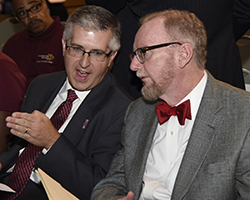
Jaggy and members of the GPC Spirit Team entertain at Fall Convocation. (photo by Leita Cowart)

Rob Watts, GPC’s interim president, right, and Dr. Houston Davis, USG executive vice chancellor, both spoke at Fall Convocation. (photo by Bill Roa)
GPC’s ‘future looks excellent’ as college begins its 51st year
Employees at Georgia Perimeter College met for the school’s annual Fall Convocation amidst the backdrop of a milestone anniversary and sound economic news.
Ron Stark, GPC’s chief financial officer, delivered a brief but welcome update on the college’s financial status—which he says has improved dramatically over the past several years.
“Our future looks excellent,” he told the gathering of faculty, staff and some students. Stark stressed that a number of solid accounting practices have led to the college now operating in the black, with a $13.7 million surplus.
“I’m going to leave GPC in great financial shape,” he said, referring to his pending retirement next year.
Borrowing from a Yogi Berra quote—“If you don’t know where you’re going, you’ll end up someplace else”—Stark also talked about the impact changes to the University System of Georgia funding formula will have on Georgia Perimeter. Currently, USG colleges and universities receive funds largely based on enrollment. Starting in 2016, the USG will base funding on student retention and graduation.
 Convocation keynote speaker Dr. Houston Davis, USG executive vice chancellor, says GPC—as it marks its 50th anniversary as a two-year open access college—is uniquely prepared to address this challenge.
Convocation keynote speaker Dr. Houston Davis, USG executive vice chancellor, says GPC—as it marks its 50th anniversary as a two-year open access college—is uniquely prepared to address this challenge.
“We know what a special asset Georgia Perimeter is to this state,” Davis said.
Davis also referenced the USG’s Complete College Georgia initiative that has a goal of graduating 250,000 students statewide in just over 10 years.
More college graduates are needed, he said, to meet the state’s projected workforce demands. He cited statistics from a couple of decades back showing 23 percent of jobs in Georgia required a college degree or certificate, compared to 62 percent projected in 2018.
GPC interim President Rob Watts underscored the importance of numbers, but also encouraged faculty and staff to look beyond the quantitative analysis of what they do. He says they must simultaneously consider the measurements, while drawing strength from what drew them to careers in higher education.
“The numbers matter,” Watts said. “They are one indicator of how we are doing as a college…but the numbers are not sufficient enough to know, appreciate and judge a college.”
What really matters, he added, is that “you are transforming lives.”
